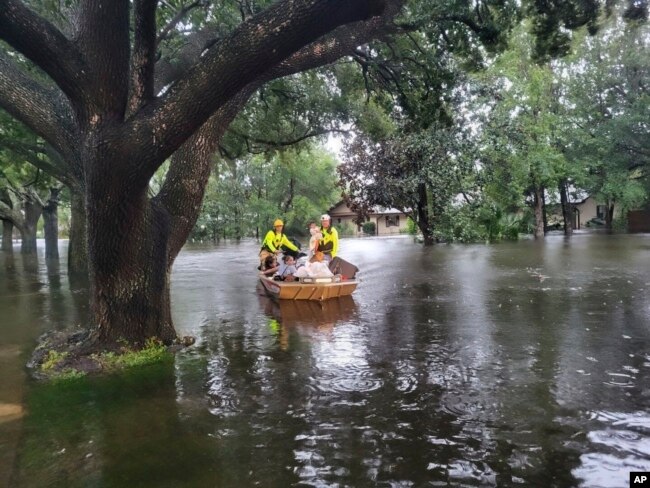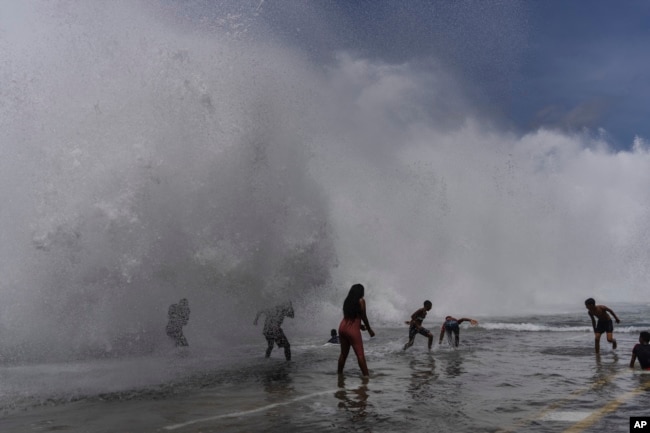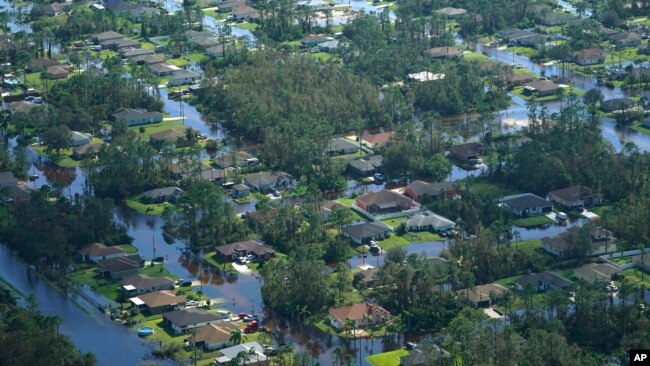年々増すハリケーン、台風の脅威
2022年10月1日4:23午前5時間前更新のロイター通信によれば、すでに再上陸しています。
被害が大きくならないことを祈ります。
気温が1度上昇の恐ろしさを再確認し、実効性ある対策を!!
VOAで英語を学びましょう。
気候変動がハリケーンIanの被害を拡大させたとの研究結果 (和訳)
Study Finds Climate Change Added More Rain to Hurricane Ian
October 01,2022
ハリケーン・イアンがアメリカのサウスカロライナ州に向かっています。、この強力な暴風雨は、すでにフロリダからキューバに至るまで、破壊の道を残しています。
キューバでは、火曜日にハリケーンの影響で島全体が停電になりました。2日後、首都ハバナの電力はわずか10%しか修復されていません。当局によると、この嵐で少なくとも3人が死亡したとのことです。当局は、被害の全容をまだ把握していません。
ハリケーンは、メキシコ湾の暖かい海をフロリダに向かって進むにつれて、さらに強くなりました。フロリダでは、家屋が倒壊し、人々が浸水地域に閉じ込められ、260万戸の家屋と事業所が停電になりました。
フロリダ州では、少なくとも6人がこの嵐で死亡しました。ジョー・バイデン米大統領は木曜日、イアンは”フロリダ史上最悪のハリケーン”になるかもしれないと述べました。
気候変動が雨を増やした
嵐の直後、科学者たちは、気候変動がハリケーンに少なくとも10%以上の雨を追加した可能性があるという研究結果を発表しました。
この研究では、ハリケーン イアンの実際の雨量と、大きさや強さが似ている嵐の20種類のコンピューターモデルを比較ました。このモデルは、人為的な気候変動がない環境で作成されたものです。
「実際の嵐は、そうなっていたかもしれない嵐よりも10%雨が多かった。」とローレンス・バークレー国立研究所のマイケル・ウェーナー氏は語っています。この気候科学者は、この研究の共同執筆者です。
この最新の研究は、まだ外部の科学者によって検証されていません。
ウェーナー氏と大気科学者のケビン・リード氏は今年初め、Nature Communications誌に2020年のハリケーンを調べた研究を発表しました。その結果、ハリケーンの最も雨の多い3時間の間に、温室効果ガスが熱を閉じ込めていない世界よりも10パーセント以上雨が多いことがわかりました。ウェーナー氏とリード氏は、科学的に認められた同じ方法を適用して、ハリケーン イアンを研究しました。
物理学の長年の法則によると、気温が1度上昇するごとに、大気中の空気は7パーセント多く水を保持できます。今週、メキシコ湾は平年より0.8度暖かく、約5パーセント雨が多く降るはずでした。
この研究では、イアンは予想された量の2倍、つまりフロリダでは10パーセントの雨を降らせたことがわかったのです。リード氏は、10パーセントというと大したことないと聞こえるかもしれない、と言います。しかし、この10パーセントは、フロリダで降った50センチメートルの雨に加えて、さらに5センチメートルの雨が降ったことを意味します。
ケリー・エマニュエル氏はマサチューセッツ工科大学のハリケーン研究者です。一般に、温暖化すると嵐は雨が多くなると彼は言います。しかし、彼は個々の嵐について結論を出すのは避けたいと言います。
「非常に激しい雨というのは、気候変動によって起こることが予想されることです。」とエマニュエル氏は言います。「イアンのような嵐はもっと増えるでしょう。」
Study Finds Climate Change Added More Rain to Hurricane Ian
Hurricane Ian is heading toward the American state of South Carolina. The powerful ocean storm has already left behind a path of destruction, from Florida to the island nation of Cuba.
In Cuba, the hurricane knocked out electricity across the whole island on Tuesday. Two days later, only 10 percent of power in the capital city of Havana was repaired. Officials said at least three people died from the storm. Officials still do not know the full extent of the damage.
The hurricane became even stronger as it traveled across the warm waters of the Gulf of Mexico toward Florida. There, the storm destroyed properties, trapped people in flooded areas and knocked out power to 2.6 million homes and businesses.
At least six people in the state died from the storm. U.S. President Joe Biden said Thursday that Ian may be the “deadliest hurricane in Florida’s history.”
Climate change added more rain
Immediately after the storm, scientists released a study saying that climate change might have added at least 10 percent more rain to the hurricane.
The study compared actual rainfall during Hurricane Ian to 20 different computer models of storms that are similar in size and strength. The models were created in an environment with no human-caused climate change.
“The real storm was 10 percent wetter than the storm that might have been,” said Michael Wehner of Lawrence Berkeley National Lab. The climate scientist is the study's co-writer.
The latest study has not yet been examined by outside scientists.
Wehner and atmospheric scientist Kevin Reed published a study in Nature Communications earlier this year looking at the hurricanes of 2020. They found that during the hurricanes’ rainiest three-hour periods, they were more than 10 percent wetter than in a world without greenhouse gases trapping heat. Wehner and Reed applied the same scientifically accepted method to study Hurricane Ian.
A long-time rule of physics is that for every extra degree Celsius of warmth, the air in the atmosphere can hold 7 percent more water. This week the Gulf of Mexico was 0.8 degrees warmer than normal, which should have meant about 5 percent more rain.
The study found Ian dropped two times the expected amount, or 10 percent more rain in Florida. Reed said 10 percent may not sound like a lot. But that 10 percent means an additional 5 centimeters of rain fell in addition to the 50 centimeters that came down in Florida.
Kerry Emanuel is a hurricane researcher from the Massachusetts Institute of Technology. He said that, in general, a warmer world does make storms rainier. But he said he wants to avoid coming to conclusions about individual storms.
“This business above very, very heavy rain is something we’ve expected to see because of climate change,” Emanuel said. “We’ll see more storms like Ian.”
Words in This Story
knock out - v. to make useless
extent - n. used to indicate the degree to which something happens


